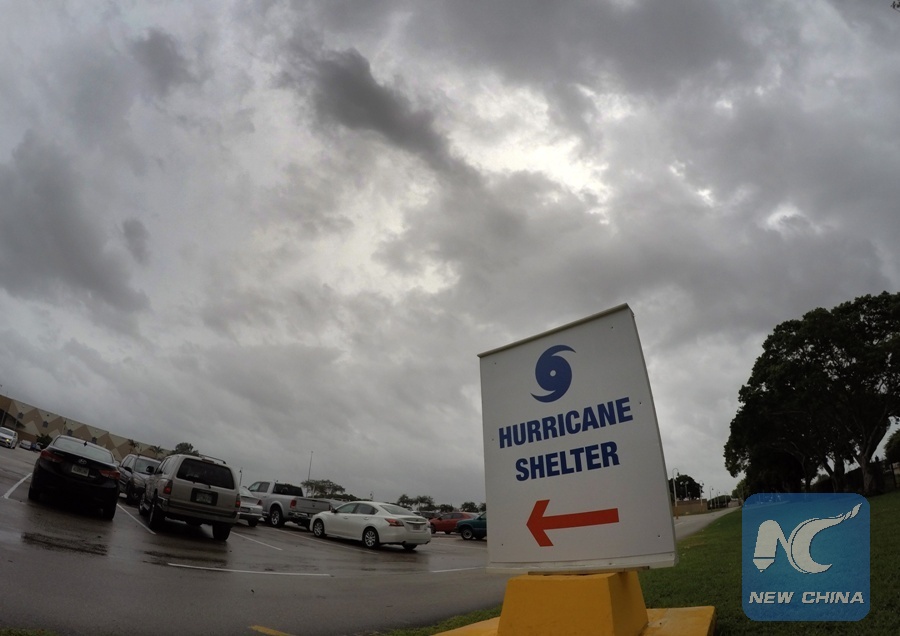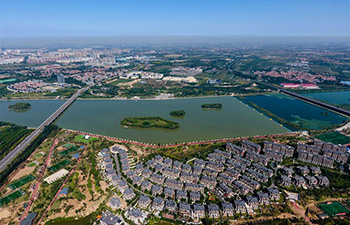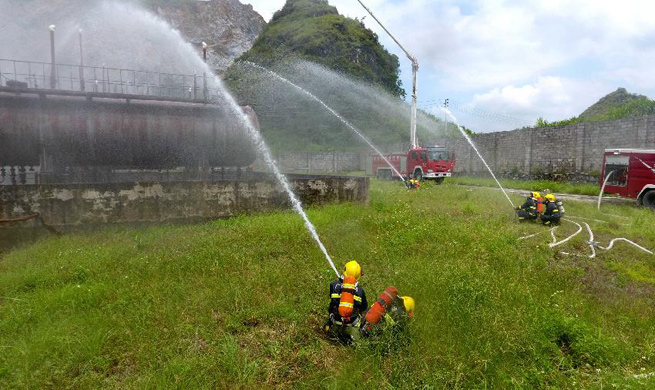
A sign of shelter is seen under dark clouds as hurricane "Irma" is approaching, in Miami, Florida, the United States, Sept. 9, 2017. (Xinhua/Yin Bogu)
by Matthew Rusling
MIAMI, the United States, Sept. 13 (Xinhua ) -- Lifelong Miami resident Karina Castillo remembered clearly a clear, sunny day last year, when high tides flooded a street in a local neighborhood.
"I was standing in water during high tide, on the street, and the water was still knee deep," she said.
That was many months before Hurricane Irma ravaged the city and made streets look like rivers, as the massive storm hit the city of Miami in the U.S. state of Florida over the weekend and grabbed nationwide headlines.
But experts said that hurricanes are not the main threat to the low-lying city, as rising sea levels threaten to put communities permanently under water.
For the first time in recorded history, ocean levels are rising, after being stable for the last 5,000 or 6,000 years. The U.S. National Ocean Service said global sea levels will likely continue to rise, and Miami residents said flooding due to rising sea level has worsened over the years.
High tides -- sometimes called king tides -- even on clear, sunny days, can cause floodwaters to seep upward to street level through Miami's drainage system. That's because the city is built on a bed of limestone, which is porous and allows water to seep upward to street level.
For communities in Miami, flooding, even by a few feet, can have a serious impact. Flooded streets can cause businesses to shutter for days at a time, impacting their bottom line, as well as employees' paychecks.
The elderly are particularly impacted, as they can miss important doctors' appointment or treatments, if vehicles are unable to traverse flooded streets to pick them up.
During one recent instance of flooding, police vehicles were unable to access one area, as their cars' warranties did not cover water damage that would likely occur from driving through knee-deep waters.
That can impact an area's safety, and floodwaters can also impact the ability of first responders get to people in an emergency. A woman in a flooded neighborhood was unable to get her regular dialysis treatments, Castillo said.
Flooding can, in some instances, cause sewer water to come up to street level, sprinkling flooded areas with human excrement and threatening to spread disease.
Describing that day many months ago, Castillo said: "The sun was beating down on me, and (the flooding) was not due to rain. It was because of high tides and water coming in from the river and also through our drains on the street."
Residents say it's gotten worse over the years, and experts said that could continue as sea levels rise here and worldwide. Eventually, flooding could become more than just an annoyance, and take a significant toll.
"It's something that's happened in the last five years, that we're seeing an increase in the magnitude and the frequency of king tide flooding areas of Miami Beach and the community of Brickell," she said, referring to Miami's downtown area.
"Sea level rise has kind of transformed some of the communities in southeast Florida, and really all along the coast of Florida," she said.
"Particularly in areas where there's poor infrastructure and poor drainage of our sewer systems," she said.
"I grew up down here. But yet in the past five to 10 years, you've seen some flooding in some residential communities, where I didn't remember that happening growing up here," said Castillo, who is also a member of Mom's Clean Air Force, an organization concerned about how climate change impacts children's health.
CITY INFRASTRUCTURE
The city has been trying to tackle the situation by installing pumps, although last month one pump failed to work because it was not connected to a backup generator, after it lost power due to a storm.
Last month, the mayors of both Miami and nearby Miami Beach vowed to push their cities to fund projects to fight flooding, although such upgrades have been discussed for years.
Miami Mayor Tomas Regalado has called on officials to address needs involving drainage, which were identified five years ago. The mayor is pushing for a multimillion-dollar infrastructure project involving pumps, sea walls and other measures meant to protect the city from rising seas.
In recent days, Hurricane Irma has demonstrated that Miami's drainage system is not equipped to handle large amounts of water.
On Sunday, Brickell Avenue, the downtown area's main drag and most populated area, looked like a river, with around three feet of water flowing through, carrying debris, trash and tree branches. Local media also reported that someone saw a mattress floating around.
"We have poor drainage system and Miami ... has a lot of infrastructure problems and they are neglecting smart investment into infrastructure," Castillo said.
"So as we continue to see ... sea level rising, we're seeing the consequences of not planning for the long term, so we're seeing that affect our communities now," she said.
KING TIDES AND RISING SEA LEVELS
Daniel Kreeger, executive director of the Association of Climate Change Officers, explained to Xinhua how king tides flood the area.
"For Florida it's an issue because the king tides are already a problem for us without a hurricane," said Kreeger, a Florida native.
During superstorm Sandy in 2012, which hit New York, national media attention was centered on damage to New York. But at the same time, Kreeger was seeing flooding in the Miami area, despite the absence of rainfall.
"Everyone was focused on what was going on in New York, and I'm looking and saying 'we've got huge chunks of land that are under water here, and we're not even getting rainfall.' That's the scary part," Kreeger said.
"Everyone wants to focus on the hurricane or the storm, and those are dangerous things, and you need to be resilient to that acute event. But the chronic (issue) is that if the water keeps rising, at some point or another you're just in a pool," he said.
Noting that the area sits on a foundation of limestone, which allows water to seep up from below street level, Kreeger said: "Your long term problem is not what comes from above, it's what's coming from below."
Some experts and observers argued that the area can use technology to adapt to the changing circumstances, as long as there is political will to deliver.

















